CGPA to Percentage Calculator
Advanced Grade-Conversion Calculator. Convert CGPA to Percentage, SGPA to Percentage and Percentage to CGPA vice-versa. This online calculator tool is helpful for Students, teachers and other educators.
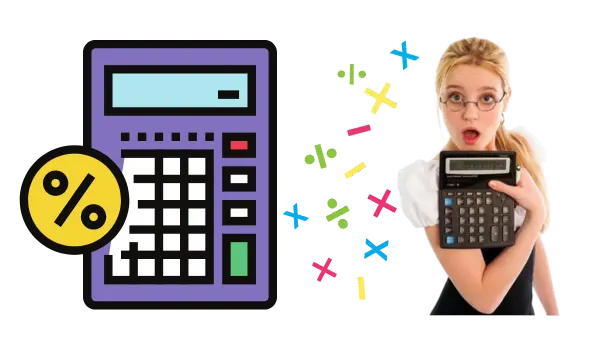
CGPA TO PERCENTAGE CALCULATOR
Select Grading Scale
Your Percentage: %
Accuracy
The CGPA to Percent calculator is designed with modern technology, accurate logic and formulas.
Responsive
This online calculator tool is user-friendly and responsive on any mobile, web or tablet device.
Fast
It has implemented fast loading and quick calculation technology. So you will get your output within a second.
GRADING CALCULATOR
Select Subjects
CGPA to Percentage Calculator: A Comprehensive Guide
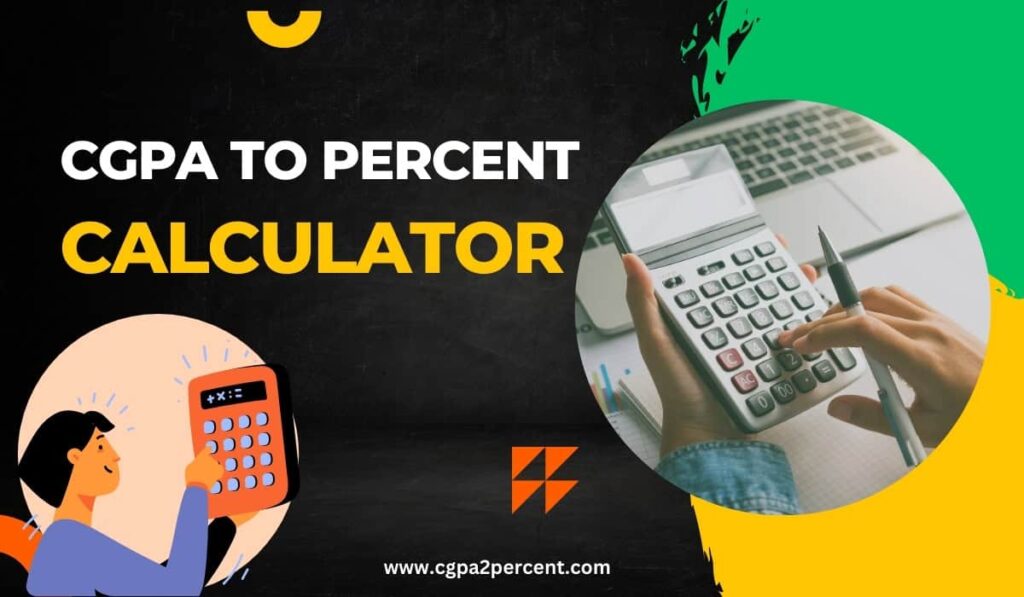
The CGPA (Cumulative Grade Point Average) system was implemented in India by the Central Board of Secondary Education (CBSE) starting from the academic year 2009-2010. India has implemented the CGPA grading system in most colleges, universities, and even at the HSLC and HS board levels.
So, It’s crucial to know how to use CGPA to Percentage Calculator for every student and educator alike. But it’s quite confusing for someone how to convert your CGPA to a percentage manually. Keeping this in mind I have developed a fully functional CGPA to Percentage, Percentage to CGPA calculator conversion tool. This will help you in your day-to-day life. Let us look at the Table of Contents below-
Table of Contents:
- What is CGPA and How Does It Work?
- Example of CGPA Calculation
- How to Convert CGPA to Percentage
- CGPA to Percentage Conversion Table
- Difference Between GPA and CGPA
- Converting CGPA to GPA
- Accuracy and Reliability of CGPA to Percentage Calculators
- Strategies to Improve Your CGPA
- Is Scoring High Marks in Academics Important?
- Conclusion
- FAQs

What is CGPA and How Does It Work?

In the academic world, grading systems are widely known throughout the country in every institution. One common system in many parts of the world, especially in India, is the CGPA. The Full form of CGPA is; C= Cumulative, G=Grade P=Point, A=Average.
But one common question everyone asks is; what is exactly CGPA, and how does it work?
In this guide, I will walk you through the fundamentals of CGPA, its calculation, and its significance in academic evaluation.
Breaking Down CGPA Calculation
- Subject-Matter Grading: Each subject gets a grade point based on the marks received. For instance, an A+ might equate to 10, an A to 9, and so forth. This scale can vary between institutions.
- Credit Points: Each subject is assigned specific credits based on its significance and the time devoted to it. Credits reflect the relative importance of each subject.
- Weighted Grade Points: Multiply the grade points by the credits assigned to each subject. This gives you the weighted grade points.
- Total Calculation: Sum up all the weighted grade points for the term or year.
- Divide and Conquer: Divide the total weighted grade points by the total number of credits earned during that period. This final number is your CGPA.
What is CGPA?
CGPA is a measure of a student’s overall academic performance over a specified period. On the other hand, it also measures the entire academic program or a set of semesters. Unlike percentage grades, which provide a numerical score, CGPA is presented on a scale, usually ranging from 1 to 10.
Example of CGPA Calculation
Here in below, I have shown you a table that provides a clear representation of marks obtained, corresponding grades, and grade points for each subject. It also demonstrates how to calculate percentages from CGPA. This example will give you a more clear understanding of CGPA.
Table for Six Subjects Mark Obtained, Grades, and Grade Points:
| Subject | Marks Obtained | Grade | Grade Point |
| English | 85 | A2 | 9 |
| Alt English | 78 | B1 | 8 |
| Maths | 92 | A1 | 10 |
| Science | 65 | B2 | 7 |
| Social Science | 88 | A2 | 9 |
| History | 74 | B1 | 8 |
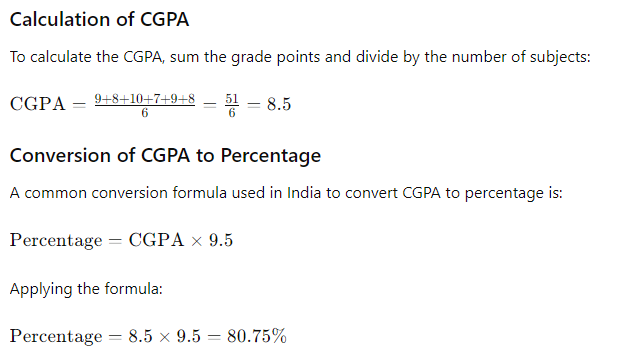
Summary Table:
| Subject | Marks Obtained | Grade | Grade Point |
| English | 85 | A2 | 9 |
| Alt English | 78 | B1 | 8 |
| Maths | 92 | A1 | 10 |
| Science | 65 | B2 | 7 |
| Social Science | 88 | A2 | 9 |
| History | 74 | B1 | 8 |
| Total CGPA | | | 8.5 |
| Percentage | | | 80.75% |
How to Convert CGPA to Percentage?
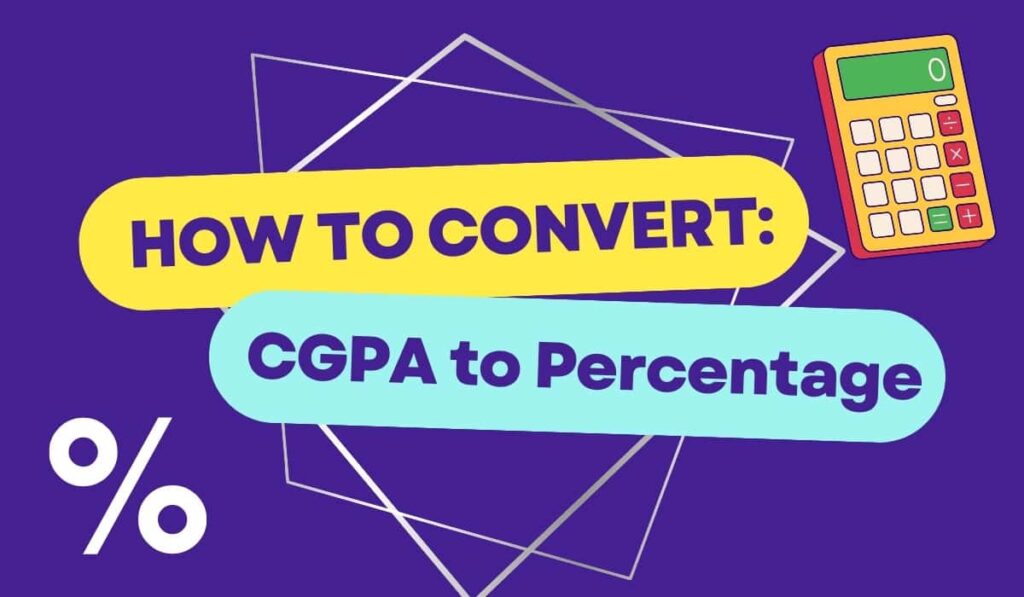
So, you are already familiar with the term CGPA, its formula and its calculation method. Now I will guide you on how to convert CGPA to Percentage in a simple way. You know that different institutions have specific formulas for converting CGPA to percentages. Generally, the process involves multiplying the CGPA by a conversion factor. In the below, I have given you two solutions to convert percentage to CGPA.
- Use our CGPA to Percentage Converter tool
- To use Simple Conversion Formula.
Using CGPA to Percentage Calculator tool
Our CGPA to Percentage tool simplifies this process:
Step 1: Select the grading Scale e.g; 4.0, 5.0 or 10.0
Step 2: Enter your CGPA
Step 3: Click “Calculate.”
Step 4: View your CGPA Percentage with a pie diagram instantly. (As shown in the below screenshot)
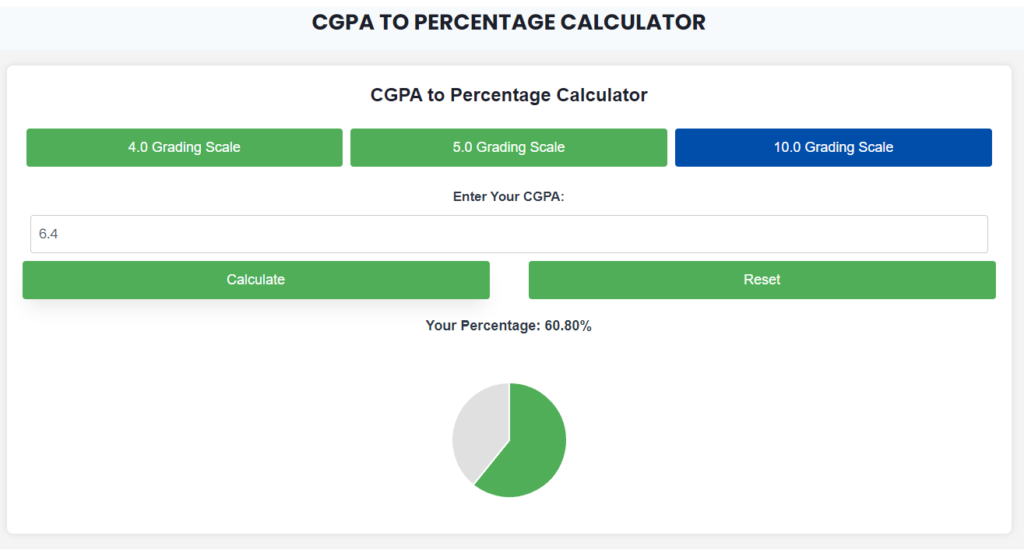
Using Simple Conversion Formula
Below section, I have provided you CGPA to Percentage Converting Formula with calculation.
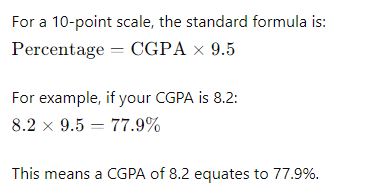
The above-mentioned formula and calculation is a manual process, if you want to do this calculation with the help of an application simply use our CGPA to Percentage Calculator tool.
CGPA to Percentage Conversion Table:
| CGPA | Percentage |
| 10.0 | 95%-100% |
| 9.9 | 94.05% |
| 9.8 | 93.10% |
| 9.7 | 92.15% |
| 9.6 | 91.20% |
| 9.5 | 90.25% |
| 9.4 | 89.30% |
| 9.3 | 88.35% |
| 9.2 | 87.40% |
| 9.1 | 86.45% |
| 9.0 | 85.50% |
| 8.9 | 84.55% |
| 8.8 | 83.60% |
| 8.7 | 82.65% |
| 8.6 | 81.70% |
| 8.5 | 80.75% |
| 8.4 | 79.80% |
| 8.3 | 78.85% |
| 8.2 | 77.90% |
| 8.1 | 76.95% |
| 8.0 | 76% |
| 7.9 | 75.05% |
| 7.8 | 74.10% |
| 7.7 | 73.15% |
| 7.6 | 72.20% |
| 7.5 | 71.25% |
| 7.4 | 70.30% |
| 7.3 | 69.35% |
| 7.2 | 68.40% |
| 7.1 | 67.45% |
| 7.0 | 66.50% |
| 6.9 | 65.55% |
| 6.8 | 64.60% |
| 6.7 | 63.65% |
| 6.6 | 62.70% |
| 6.5 | 61.75% |
| 6.4 | 60.80% |
| 6.3 | 59.85% |
| 6.2 | 58.90% |
| 6.1 | 57.95% |
| 6.0 | 57% |
| 5.9 | 56.05% |
| 5.8 | 55.10% |
| 5.7 | 54.15% |
| 5.6 | 53.20% |
| 5.5 | 52.25% |
| 5.4 | 51.30% |
| 5.3 | 50.35% |
| 5.2 | 49.40% |
| 5.1 | 48.45% |
| 5.0 | 47.50% |
| 4.9 | 46.55% |
| 4.8 | 45.60% |
| 4.7 | 44.65% |
| 4.6 | 43.70% |
| 4.5 | 42.75% |
| 4.4 | 41.80% |
| 4.3 | 40.85% |
| 4.2 | 39.90% |
| 4.1 | 38.95% |
| 4.0 | 38% |
Difference Between GPA, CGPA and SGPA
| Term/Concept | Description | Main Differences |
|---|---|---|
| GPA (Grade Point Average) | Represents the average score for a specific term or semester. | Each grade corresponds to a numerical value (e.g., A = 4, B = 3, etc.). |
| CGPA (Cumulative GPA) | Reflects the overall academic performance over all completed semesters. | Calculated by averaging the GPAs of all semesters attended. |
| SGPA (Semester GPA) | Similar to GPA but specifically for a single semester. | Calculates the average score for courses taken within that semester. |
In the above table, outlines the definitions and points of GPA, CGPA, and SGPA, helping to differentiate their roles in academic assessment.
Converting CGPA to GPA
Converting a 10-point CGPA to a 4-point GPA is straightforward:

Here’s a rough GPA to CGPA-conversion table:
| CGPA | GPA |
| 10.0 | 4.00 |
| 9.0 | 3.68 |
| 8.0 | 3.36 |
| 7.0 | 3.04 |
| 6.0 | 2.55 |
| 5.0 | 2.05 |
| 4.0 | 1.47 |
Keep in mind, that is an approximation. Official conversions might different slightly.
Accuracy and Reliability of CGPA to Percentage Calculator
Using calculators for CGPA to percentage conversions is helpful but always check your institution’s guidelines for exact methods. These tools provide a quick estimate but for official purposes like university applications, refer to formal transcripts.
How can I improve my CGPA?
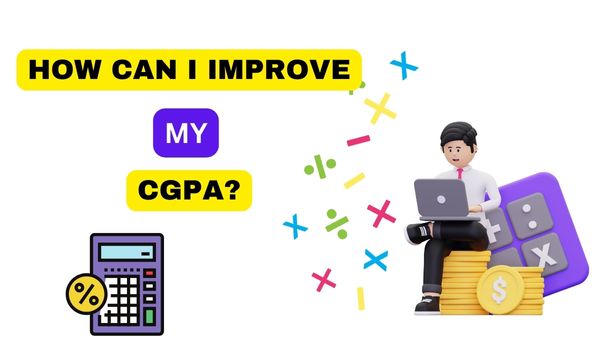
Improving your CGPA involves consistent study habits, active class participation, seeking help when needed, effective time management, regular self-assessment, focusing on weak areas, and maintaining a healthy lifestyle.
I have shared with you some important Strategies that help you improve your CGPA-
Strategies to Improve Your CGPA
Improving your CGPA involves consistent effort and smart strategies. Here are some tips:
- Regular Study Schedule: Stick to a routine. Regular study sessions enhance understanding and retention.
- Active Participation: Engage in class activities. Ask questions, participate in discussions, and stay involved.
- Seeking Peer/Group Help: Don’t hesitate to ask for help when needed. Use resources like tutoring centres, online forums, or study groups.
- Effective Time Management: Balance study with other activities. So you have to prioritize tasks systematically and manage your time wisely.
- Continuous Evaluation: Regularly assess your performance. Take mock tests, solve past papers, and seek feedback.
- Focus on Weak Areas: Identify and work on subjects where you score lower after that focus on a particular area. Arrange supplementary resources or guidance for improvement.
- Healthy Lifestyle: Lastly, maintain a balanced diet, exercise and sleep well regularly. A healthy body supports a sharp mind.
Is Scoring High Marks in Academics Important?
In today’s competitive world, people often emphasize the importance of academic achievement. But is scoring high marks that crucial? Yes, it is. Academic achievements play a significant role in shaping your future. Achievement of high marks in Academics provides short-term benefits, opening doors to future opportunities, and fostering essential life skills. Let me tell you why academic success matters, its impacts on various aspects of life, and how it contributes to personal growth.

Importance of Academic Achievement in Your Life
First of all, we have to understand why academic achievement matters. There are several reasons that directly or indirectly impact our lives. In this part, I will discuss some key points why academic achievement is important for us. These key points are as follows:-
I. Short-term Benefits of Academic Achievement:
- Higher Grades and Test Scores : Getting high grades and test scores brings immediate benefits like academic recognition and a sense of accomplishment. It shows that you understand and master your subjects well. To measure this achievement tools like the academic score calculator or GPA to CGPA tool can help.
- Increased Confidence and Self-esteem: When you score well, it boosts your confidence and self-esteem. You feel more capable and motivated to tackle future challenges, which fosters a positive attitude towards learning.
- Better Relationships with Teachers and Peers: High academic performance often leads to better relationships with teachers and peers. Teachers tend to support and encourage high-performing students, and peers may look up to them, creating a positive social environment.
II. Long-term Impact on Future Opportunities
- College Admissions Advantages: High academic marks can significantly improve your college admission prospects. Prestigious colleges and universities often seek students with excellent academic records, using academic grading conversion tools to evaluate candidates from different educational systems.
- Scholarship Opportunities: Many scholarships are merit-based, requiring high academic performance scores. Scoring well can lead to financial aid, reducing the burden of education costs.
- Improved Career Prospects: Employers often look for candidates with strong academic backgrounds. High academic achievements can lead to better job opportunities and career growth, providing a competitive edge in the job market.
III. Developing Critical Life Skills
- Time Management and Organization: Academic success often requires effective time management and organizational skills. You learn to balance studies, extracurricular activities, and personal life, preparing you for future responsibilities.
- Problem-solving and Critical Thinking: Through academic challenges, you develop problem-solving and critical-thinking skills. These abilities are essential in both personal and professional settings, helping you navigate complex situations.
- Perseverance and Goal-setting: High academic achievement teaches perseverance and the importance of setting and achieving goals. These skills are valuable throughout life, encouraging continuous personal and professional growth.
IV. Social and Emotional Benefits
- Sense of Accomplishment and Pride: Achieving high marks gives you a sense of pride and accomplishment. This positive reinforcement encourages you to strive for further success.
- Reduced Stress and Anxiety about the Future: Academic success can reduce anxiety about the future by providing a clear path to higher education and career opportunities. Knowing you have options can alleviate stress and promote well-being.
- Positive Influence on Peer Groups: High-achieving students often set positive examples for their peers. Their dedication and success can inspire others to improve their academic performance.
V. Academic Achievement and Personal Growth
- Fostering a Love for Learning: Academic success can foster a love for learning. Students who perform well are often more curious and eager to explore new subjects, leading to lifelong learning.
- Discovering Passions and Interests: Through academic exploration, you can discover your passions and interests. High achievement allows you to pursue these areas further, potentially shaping your career paths.
- Building a Strong Foundation for Lifelong Learning: High academic performance builds a strong educational foundation. This foundation supports continuous learning and adaptation, which is essential in an ever-changing world.
VI. Overcoming Challenges in Academic Achievement
- Addressing Learning Difficulties: You may face learning difficulties, but you can overcome these challenges and achieve academic success with the right support and resources.
- Balancing Academics with Extracurricular Activities: Balancing academics and extracurricular activities is crucial. Both contribute to a well-rounded education and personal development.
- Dealing with Pressure and Expectations: Managing pressure and expectations is part of academic life. Developing resilience and coping strategies helps you handle stress and maintain performance.
VII. The Role of Support Systems
- Parental Involvement and Encouragement: Parental involvement and encouragement are vital for academic success. Parents who support their children’s education contribute to their motivation and achievement.
- Teacher Guidance and Mentorship: Teachers play a significant role in guiding and mentoring students. Their support can inspire and motivate students to excel academically.
- School Resources and Programs: Schools provide resources and programs that support academic achievement. Access to libraries, tutoring, and extracurricular activities enhances learning experiences.
VIII. Measuring Academic Achievement Beyond Grades
- Holistic Approaches to Assessment: Academic achievement should be measured holistically, considering various aspects of student development beyond grades.
- The Importance of Personal Growth and Improvement: Focusing on personal growth and continuous improvement is essential. Academic success is not just about high grades also it develops a well-rounded individual.
Academic achievement is undeniably important. It provides immediate benefits, shapes future opportunities, and fosters essential life skills. By striving for academic excellence you can secure your future. It also develops personally and emotionally. Encouraging academic success is crucial for building a strong foundation for lifelong learning and achievement.
Conclusion
In conclusion, I am confident that you now understand how to convert CGPA to percentage. This conversion is essential for every educator as CGPA plays a crucial role in academic success and future opportunities. Our CGPA to Percentage Calculator simplifies this process, allowing you to focus on what matters most in your studies.
To achieve your academic goals, remain consistent, seek assistance when needed, and continuously evaluate your performance. By employing these strategies, you can improve your CGPA and reach your academic objectives.
CGPA to Percentage FAQs:
1. How to calculate CGPA percentage?
To calculate your CGPA percentage, you typically multiply your CGPA by 9.5. This conversion factor might vary between institutions, so check with your specific university’s guidelines. For example, if your CGPA is 8.0, the calculation would be: 8.0×9.5=76%
2. What is the formula for converting CGPA to a percentage?
The standard formula used by many institutions is:
Percentage=CGPA×9.5
This formula is derived from the average performance of students over the years, ensuring a fair conversion from CGPA to percentage.
3. How accurate is the CGPA to Percentage calculator?
The CGPA to Percentage calculator provides a quick and reasonably accurate conversion. However, the exact conversion might vary slightly depending on your institution’s specific rules. It’s my suggestion: always check your official academic guidelines for precise calculations.
4. How does the CGPA grading scale work?
The CGPA grading scale typically ranges from 1 to 10. Each grade point corresponds to a specific range of marks, which can vary by institution. For instance, a grade point of 9 might correspond to marks between 85% and 89%.
5. Can the CGPA to Percentage conversion vary between institutions?
Yes, the conversion factor can vary. While many institutions use 9.5 as the multiplier, others might use different values based on their grading standards. Always refer to your institution’s official guidelines.
6. What is the standard multiplier used in CGPA to Percentage conversion?
The standard multiplier is 9.5. However, this can differ among institutions. It’s always best to confirm with your school or university.
7. How does a CGPA of 10 convert to a percentage?
Using the common conversion factor of 9.5, a CGPA of 10 converts to:
10×9.5=95%
8. Is there a difference between the 4.0 and 10.0 grading scales in CGPA?
Yes, there’s a significant difference. The 10.0 scale is often used in India and some other countries, while the 4.0 scale is prevalent in the United States. Converting between these scales involves specific formulas, and understanding the local grading system is crucial.
9. Are there tools available to automatically convert CGPA to a percentage?
Yes, there are many online tools and calculators designed to convert CGPA to percentages. These tools use standard conversion formulas and provide quick results. Our CGPA to Percentage Calculator is one such reliable tool.
